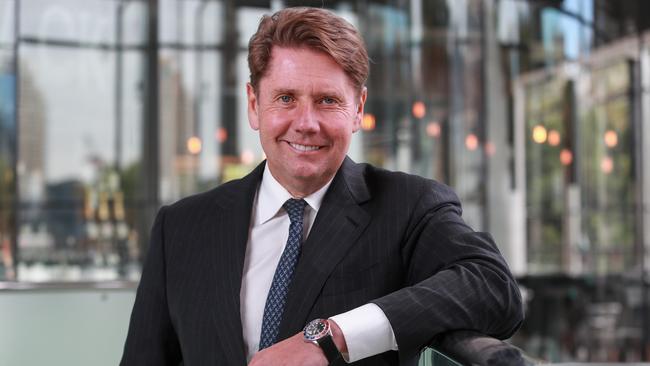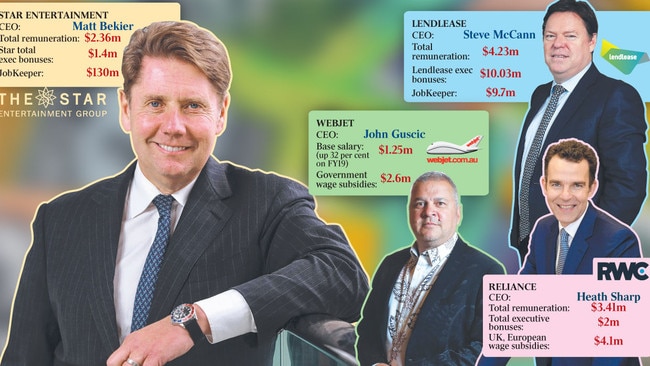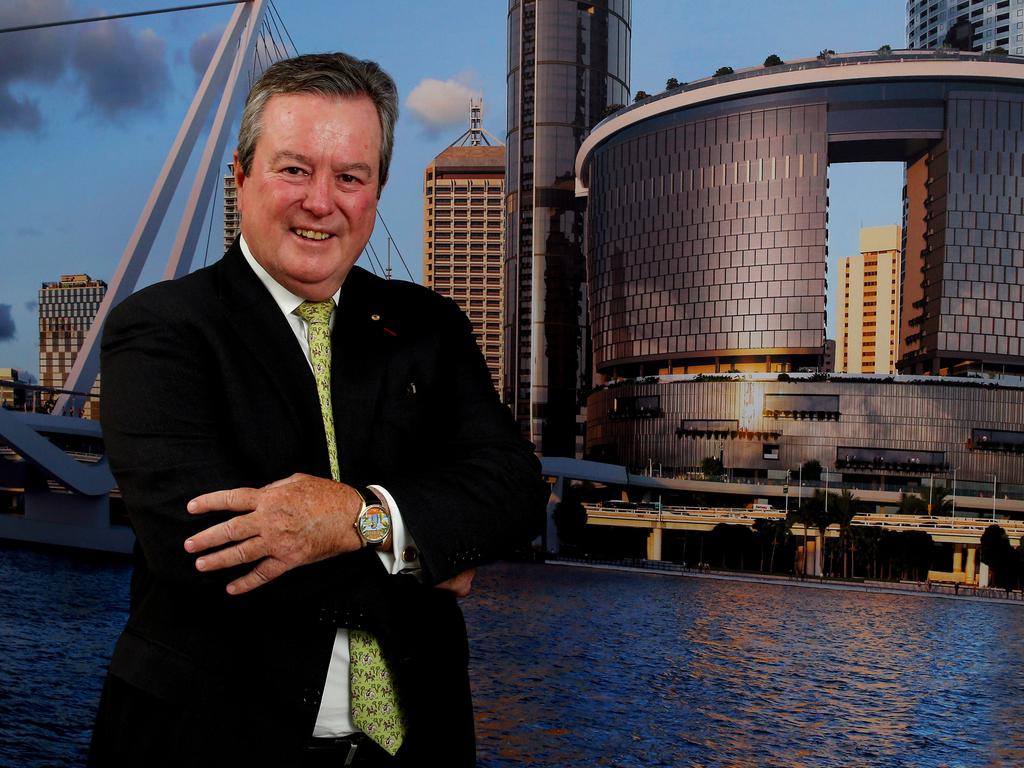Executive bonuses roll on while accepting JobKeeper cash
A group of ASX-listed companies have continued to pay executives bonus or other benefits while collecting more than $200m from JobKeeper payments.

A number of ASX-listed companies have paid their top executives more than $15.6m in bonuses or other benefits after putting their hands out for more than $209m in taxpayer cash to help fund their workforce during the COVID-19 pandemic.
The payouts comes as the Morrison government is set to wind back the wage subsidies at the end of the month, which have been used to prop up companies ranging from casinos and construction companies to smash repairers and motorcycle dealerships.
Executive bonuses have been the subject of scrutiny as more than a million Australians have lost their jobs during the pandemic and investors face cuts in dividend payouts.
This month, Australia Post’s board vetoed $7m in executive payments, following pressure from both sides of politics and the community.
While chief executives have generally felt the financial pain of the coronavirus crisis, with pay levels at some of the nation’s biggest companies falling as corporate earnings come under pressure, others have continued to collect lucrative pay packets, despite receiving millions of dollars from taxpayers to help fund their workforce.
The move came as former Dow Chemical CEO Andrew Liveris said executive remuneration needed to be rebased.
“I really do believe governance, ethics — corporate and otherwise — has to go through a sea change. I really do think, and I’m on record in the US for saying this and my peers hated me, that CEOs get paid too much,” Mr Liveris told the National Press Club in Canberra on Wednesday.
“I’m on record for saying we should pay more taxes and I’m on record for saying we should be giving back rather than taking.”
Casino operator Star Entertainment has been one of the biggest recipients of JobKeeper payments, expecting to receive $130m in taxpayer cash after it stood down almost 7000 staff after the forced closure of most of its operations in March.
Despite missing its targets for its executive short-term incentive program, Star’s board used its “discretion” to pay four of its top executives $1.4m in bonuses.
The company opted to pay out short-term incentive payments in the form of deferred equity this year to “preserve cash” during the COVID-19 pandemic.
Chief executive Matt Bekier received $829,872 in deferred equity on top of his $1.56m base salary, taking his total remuneration to $2.36m.
But Mr Bekier’s could have received more. He agreed to a 40 per cent pay cut, while non-executive directors took a 50 per cent cut to their fees.
Star’s remuneration committee chair Sally Pitkin said while the group did not hit its short term incentive (STI) target, the board decided to pay short term bonuses in the form of deferred equity, subject to a one-year retention restriction, because the group was performing ahead of budget before the COVID pandemic struck.
“The group did not achieve the financial gateway under the STI, however, the board has decided to exercise its discretion to make limited equity awards under the FY20 STI,” Ms Pitkin said in the group’s annual report.

“The group was performing strongly against all key strategic and operational metrics in FY20 until the COVID-19 pandemic occurred, requiring the mandatory shutdown of operations in March 2020. Pre-COVID-19, normalised NPAT up to the end of February 2020 was 15.6 per cent ahead of the (prior corresponding period) and 5 per cent ahead of budget.
“Both guest satisfaction and safety measures were at or above expectations. Following the impact of COVID-19, the group’s full year normalised NPAT of $120.8m was 46 per cent below the prior year and 49 per cent below target.”
The casino operator stood down about 90 per cent of its workforce after the federal and state government’s banned non-essential businesses on March 25, leading to the cessation of Star’s gaming activities and closure of food and beverage outlets.
The annual report revealed Star expected to receive up to $130m under the federal government’s JobKeeper wage subsidy to pay the wages of almost 7000 staff up to September 27. Star’s chose not to pay a final dividend.
Construction major Lendlease has also ensured its executives led by Steve McCann are well rewarded, paying out $10.03m in incentive payments, while collecting $15m in government wage subsidies across the globe, including $9.7m from the Australian government.
“For the first nine months of the year, the business performed well. As the pandemic situation has evolved and as a result of providing for the costs of separating the engineering business, in line with those previously advised, a statutory loss was recorded for FY20,” Lendlease chairman Michael Ullmer said.
“The receipt of a modest amount of COVID-19 related assistance from governments had no influence on the quantum of awards.
“For executives, the board determined that no cash STA (short term award) would be awarded in FY20 and it was more appropriate to issue an FY20 deferred equity award albeit at a reduced quantum. Half of the award is scheduled to vest in September 2021 and the balance in September 2022.”
Plumbing supplies group Reliance Worldwide paid its executives more than $2m in bonuses. While it did not receive JobKeeper, it collected $4.1m in UK and European wage subsidies.
Its chief executive Heath Sharp docked his pay by 20 per cent in May and June, costing him $66,000. But he made up for the cut, receiving a $266,150 short-term incentive payment.
Other companies such as Webjet decided to cancel their bonus schemes, but CEO John Guscic benefited from a 32 per cent pay increase, lifting his base remuneration to $1.246m. The online travel agent collected government grants totalling $2.6m from Australia, New Zealand, Singapore, UK, Spain and Hong Kong.
Auto repairer AMA Group was another big beneficiary of government support, collecting $34.3m from Australia and New Zealand taxpayers. It awarded its executives $783,068 in performance rights, and former CEO Raymond Smith-Roberts a $92,431 bonus.
AMA’s current CEO Andrew Hopkins collected $430,412 in performance rights, taking his remuneration to $1.623m.
Other companies to collect Jobkeeper while paying their executive other benefits include McMillan Shakespeare, Motorcycle Holdings and Redflex.






To join the conversation, please log in. Don't have an account? Register
Join the conversation, you are commenting as Logout